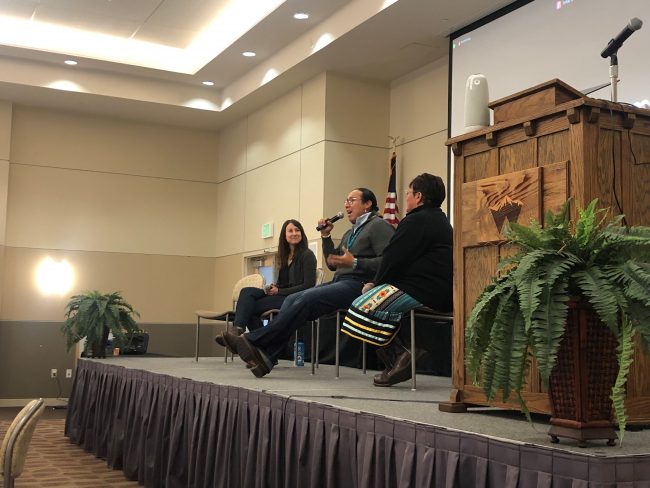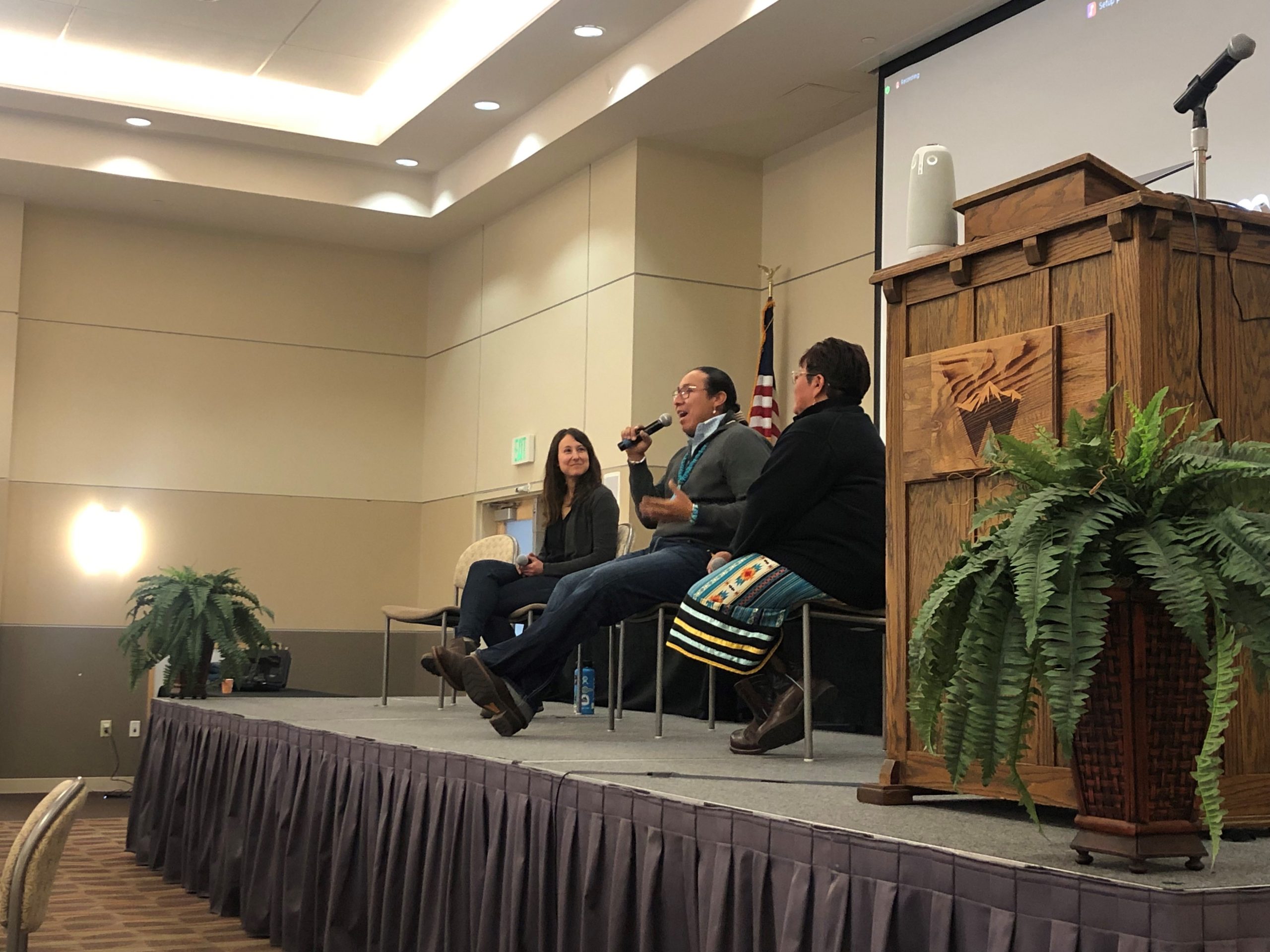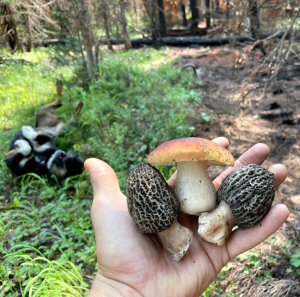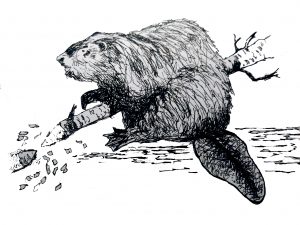WHAT DOES IT MEAN TO BE IN DEEP RELATIONSHIP with the land on which we live?
The 33rd Annual Headwaters Conference, hosted by Western Colorado University in Gunnison in December 2022, aimed to answer that question. The theme of the conference was “Land Back: Indigenous Homecoming in the Headwaters.”
In recent years, the conference focused on themes of culturally inclusive climate action, grief and hope in the era of climate change as well as what it means to be a good ecological citizen. The most recent conference brought together indigenous community leaders, representatives of environmental and conservation organizations, and university faculty and students to share knowledge and envision restorative models for human participation within the landscape.
“‘Land’ is a bigger term than we think when we first hear that phrase,” said Dr. John Hausdoerffer, Headwaters director and dean of the Clarke School of Environment and Sustainability. “We came together to talk about land as medicine, land as relative, land as the basis of life, land as alive. And the word ‘back’ means much more than we think when we first see it: indigenous people back, the safety of cultural integrity and dynamism back, a sense of home, here in the land around Western, back.” He emphasized the university’s ongoing responsibility to “slowly and patiently rebuild a partnership with the descendants of the original inhabitants of the land upon which our campus sits.”
The conference opened with a keynote address by Dr. Melissa Nelson, professor of indigenous sustainability at Arizona State University and a member of the Turtle Mountain Band of the Chippewa. Nelson discussed the history of displacement of indigenous peoples and current efforts — and successes — to reclaim their ancestral lands. She emphasized the diverse approaches and complex challenges of the Land Back and ReMatriation Movements, which seek to restore ancestral lands to indigenous peoples as well as protect food sovereignty and cultural practices on a broad scale. By extension, she said, this will combat “diseases of displacement” like diabetes and obesity.
Programming the following day began with a presentation on the history of native nations in the region by Rick Waters, Kiowa/Cherokee elder and executive director of the Denver Indian Center, and Richard Williams, Oglala Lakota/Northern Cheyenne elder and former CEO of the American Indian College Fund, giving attendees a clearer sense of the diverse cultures represented. Next, Regina Lopez-Whiteskunk of the Ute Mountain Ute Tribe of Towaoc spoke about cross-cultural partnerships in the work of the Montezuma Land Conservancy, a nonprofit land trust based in Cortez that works to protect and restore landscapes through voluntary conservation easements. Land covered by an easement is permanently protected from development based on stated conservation values.

The importance of partnership between indigenous peoples, federal agencies and nonprofit conservation programs was a key theme throughout the conference. Western student Matthew Harris sees this collaboration as a vital aspect of his career. “As a master of environmental management student and a park ranger for the BLM, I wish to advocate for the inclusion of indigenous voices and the use of TEK (Traditional Ecological Knowledge) in management decisions as it is imperative to acknowledge and learn from those who have been stewards of this land for far longer than those who manage it today.”
The conference gathered leaders from a wide variety of disciplines, including the arts. Legal action and other tangible measures to protect land are vital, said CMarie Fuhrman, director of Western’s Master of Fine Arts in Creative Writing Program and coeditor of the anthology Native Voices: Indigenous Poetry, Craft, and Conversations. But, she argues, to create deep, lasting change we need to go a step further, integrating a different way of seeing and talking about land into the fabric of our collective culture. For this, we draw from indigenous wisdom.
“We talk about how we’re going to take certain habitats and restore them to what might have been their natural state,” she says. “But in order to restore a place, we have to re-story it. If our narratives about place are always about how they’re resourced, how we can use them, how we can commodify them, how they serve us, we’re moving backwards. But if our stories talk about the way we’re going to have relationship with the land, what we’re going to give back to the land, if our stories are forward-thinking, forward-seeing to the next generations, we are creating new narratives that we can live towards, that re-story and restore a place.” Ms. Fuhrman closed the afternoon workshop sessions with a reading of her powerful land acknowledgment, “a poem to acknowledge that the land itself — along with the people whose language, culture and religion were born of it — is rarely acknowledged.”
The conference closed with an evening showing of Lakota skier and documentary filmmaker Connor Ryan’s Spirit of the Peaks, hosted by Ryan himself. The film, now streaming for free on YouTube, explores the journey to integrate his passion for skiing with his indigenous roots and a deep respect for the land. He challenged attendees to think about ways to bring conscientious land relationship to skiing and other outdoor recreation — to channel reverence for the land’s beauty into action.
“There’s an intelligence to these spaces,” he said. “When the Ute, Cheyenne and Arapahoe peoples moved through [the mountains], the danger of avalanches was no lower for them. But they understood how to move through the landscape. Skiing can take us back into that space — deep respect for a landscape that can take our lives but at the same time inspires us to live and to do incredible things.”
An event like the Headwaters Conference challenges us to rethink the stories we tell ourselves and one another about the land we call home. How will you begin to re-story your home space?
For more about the Land Back Movement, visit LandBack.org and NDNCollective.org.
Anita Mumm writes, edits and explores the natural world from her home base in Salida.



